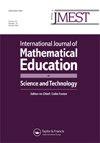协调主题作为向范围概念的更高层次概念化过渡的推动者
IF 0.6
Q3 EDUCATION & EDUCATIONAL RESEARCH
International Journal of Mathematical Education in Science and Technology
Pub Date : 2023-10-21
DOI:10.1080/0020739x.2023.2260790
引用次数: 0
摘要
摘要本文从行为(A)、过程(P)、对象(O)和图式(S)理论的角度,讨论了一项正在进行的关于线性转换概念化的心理机制的研究结果。本文报告的数据来自44名一年级线性代数学生对一个关于线性变换范围的任务的回答。我们的分析揭示了范围概念的层次/阶段与矩阵乘法表示的使用之间的相似之处。更重要的是,这些表示似乎是该系列从较低到较高APOS阶段过渡的促成因素。相反,采用其他方法的心理机制几乎没有显示出进步,有些甚至显示出错误的知识结构。关键词:线性变换,范围,apos理论机制,过渡点,协调主题感谢编辑和审稿人对本文早期版本的改进所提供的宝贵意见。披露声明作者未报告潜在的利益冲突。本材料基于德克萨斯大学系统和墨西哥国家科学委员会Tecnología (CONACYT)资助的工作。本文仅代表作者个人观点,并不一定代表这些资助机构的观点。本文章由计算机程序翻译,如有差异,请以英文原文为准。
Coordinated topics as transitional enablers towards higher-level conceptualisations of the range concept
AbstractThis paper discusses findings from an ongoing study investigating mental mechanisms involved in the conceptualisation of linear transformations from the perspective of Action (A), Process (P), Object (O), and Schema (S) (APOS) theory. Data reported in this paper came from 44 first-year linear algebra students’ responses on a task regarding the range of a linear transformation. Our analysis revealed parallels between Levels/Stages of the range concept and the use of representations of matrix multiplications. More importantly, these representations appeared to have been the enablers of transitions from lower to higher APOS Stages for the range. Conversely, mental mechanisms employing other means showed little to no progressions, some, furthermore, revealed faulty knowledge structures.KEYWORDS: Linear transformationsrangeAPOS theorymental mechanismstransitional pointscoordinated topics AcknowledgementsWe thank the Editors and the reviewers for their valuable input towards the improvement of the earlier versions of the paper.Disclosure statementNo potential conflict of interest was reported by the author.Additional informationFundingThis material is based upon work supported by a grant from the University of Texas System and the Consejo Nacional de Ciencia y Tecnología de México (CONACYT). The opinions expressed are those of the authors and do not necessarily represent the views of these funding agencies.
求助全文
通过发布文献求助,成功后即可免费获取论文全文。
去求助
来源期刊

International Journal of Mathematical Education in Science and Technology
EDUCATION & EDUCATIONAL RESEARCH-
CiteScore
3.30
自引率
11.10%
发文量
123
期刊介绍:
Mathematics is pervading every study and technique in our modern world, bringing ever more sharply into focus the responsibilities laid upon those whose task it is to teach it. Most prominent among these is the difficulty of presenting an interdisciplinary approach so that one professional group may benefit from the experience of others. The International Journal of Mathematical Education in Science and Technology provides a medium by which a wide range of experience in mathematical education can be presented, assimilated and eventually adapted to everyday needs in schools, colleges, polytechnics, universities, industry and commerce. Contributions will be welcomed from lecturers, teachers and users of mathematics at all levels on the contents of syllabuses and methods of presentation.
 求助内容:
求助内容: 应助结果提醒方式:
应助结果提醒方式:


